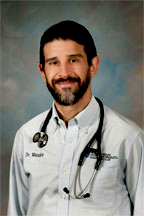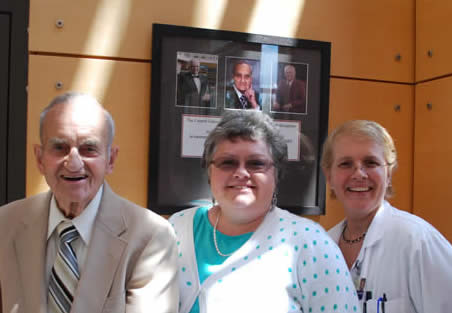Leaving a Lasting Impression
How Decades of Scholarships Honor Treasured Family and Friends
By Olivia Hall

When Tristan Weinkle ’95, D.V.M. ’99, learned that two of his favorite mentors at the Cornell University College of Veterinary Medicine (CVM) were nearing retirement, he knew just the gift for the occasion. To honor the positive role James Law Professor Sharon Center and Professor John Randolph, D.V.M. ’77 — both fixtures in the Department of Clinical Sciences — have played in his life and that of countless others, he decided to turn his and his wife Ella’s annual donations to the college into the Randolph-Center Veterinary Resident Fund for Internal Medicine.

Weinkle joins numerous CVM members and friends who have paid tribute to significant people in their lives through financial support. Among those honored are mentors, family members, friends, classmates and even beloved pets. Donors hope not only to celebrate their unique stories, values, skills and personalities, but to offer them as examples and inspiration to the community — and especially the veterinarians supported in their names.
While Weinkle earned both undergraduate and veterinary degrees at Cornell, his teachers during his internal medicine residency at CVM, starting in 2001, left the most lasting impression.
“It’s this incredibly intense learning experience, where you spend countless hours just absorbing as much information as you can,” says Weinkle, now a small animal internal medicine veterinarian in private practice in Columbia, South Carolina. “It was not at all unusual that we’d be there late into the night, talking about cases, reviewing basic pathophysiology, doing publication searches — and not only the residents and students, but also Drs. Center and Randolph. It’s a very demanding process for them as well, and unlike the residents, who get to leave after two to three years, they’ve been at it for decades. Beyond their incredible commitment to their patients, their commitment to the people they’re training and the educational process is just unmatched.”
“It was not at all unusual that we’d be there late into the night, talking about cases, reviewing basic pathophysiology, doing publication searches — and not only the residents and students, but also Drs. Center and Randolph.”
But Weinkle has also not forgotten the challenges of balancing such concentrated learning with other personal and professional needs. As a result, his fund specifically targets residents with stipends for attending professional conferences, off-campus training or research projects not fully funded by CVM.
“As best as I can tell, the financial and educational demands on residents have only grown,” he says. “People need to go to conferences to continue their learning or to other institutions to gain expertise and knowledge in certain areas. And that stuff is incredibly expensive to do for a resident, who’s making a relatively paltry income. The fund is meant to help with that.”
While Weinkle and his wife have already committed to the residency fund, they hope to inspire others to further boost its impact: “We’re hoping to really use the retirements of Dr. Center and Dr. Randolph as an opportunity to encourage members of the Cornell community, particularly past residents, to add to that fund so it can continue to grow,” Weinkle says.

Continuing the Legacy
Bonnie Basom, a retired physical therapist in Rochester, New York, was also inspired to give in the name of an esteemed veterinarian — her late father, Richard Basom, D.V.M. ’44.
Basom, who owned a small animal private practice in Henrietta, New York, for more than 40 years, set out as a 17-year-old during World War II with canned goods from the family farm to sustain himself. Relying on frugal budgeting and scholarship money, he graduated with a D.V.M. degree only four years later.
“My dad had humble beginnings and understood what it is like to follow a dream even if it is financially difficult,” says Basom. “He always expressed immense gratitude for his education and was proud to have been a Cornellian. He supported ongoing research and educational opportunities for students to succeed in their career goals, and to keep the college on the cutting edge of animal medicine. For these reasons, he felt strongly about establishing a scholarship for the benefit of future Cornell veterinary students.”
“He always expressed immense gratitude for his education and was proud to have been a Cornellian.”
To that end, Richard Basom named the college as the beneficiary of a $500,000 charitable trust in 2013 and in 2016 established the Richard Basom DVM 1944 Scholarship.
Even after her father’s death a year later, Bonnie Basom continues to support the fund, which helped six students this year. “I am proud of my father’s career as a well-respected veterinarian and his dedication to the wellbeing of animals,” she says. “I want to support those who help and care for them, and contributing to the scholarship in my father’s name is certainly a rewarding way to accomplish this.”
Inspiring the Future
CVM’s own Lorin D. Warnick, D.V.M., Ph.D. '94, the Austin O. Hooey Dean of Veterinary Medicine, was inspired by his parents’ lives and values when he and his wife, Jill, decided to commit to a five-year scholarship, coinciding with the number of years he had been appointed as dean of the college in May 2016.
“When I was selected for the position of dean, I wanted to do something that would recognize my parents and also put my own actions behind wanting to help students, and perhaps make it possible for them to have some key educational experiences.”
Warnick knows firsthand the impact of these kinds of funds — he himself was a scholarship recipient while a veterinary student at Colorado State University. “I wanted to recognize the generosity of others, and pay that forward,” he says.
When he and Jill established the gift, Warnick’s mother was 95 years old and still living on the dairy farm near Fort Shaw, Montana, where he and his six siblings were raised. While she has since passed away in 2017, it is clear Donna Warnick lives on brightly in memory. “She was just brilliant. She got top scores in all her classes in high school but because of family circumstances did not have a chance to go on to college,” says Warnick. “She was a force of nature.” In addition to having a love of learning, Donna was an adept horsewoman who mastered many skills, including boatbuilding, backpack camping and hunting, and was a community leader both in church and school. Warnick’s father, George Webb Warnick, who passed away in 1973, shared Donna’s interest in horseback riding and the outdoors. He was involved his whole life in farming and volunteered in several agricultural organizations. “Dad always had a stack of books he was reading whenever he found a break between farm work and other responsibilities — a trip to town usually included a stop at the library,” says Warnick.
“It’s a way for someone who lived an exemplary life to have that impact shine beyond their own immediate circles, and to allow it to have more public recognition.”
Both parents instilled a love of learning in their children while managing their dairy farm, improving their herd of registered Holstein cattle and also staying active in the community of Fort Shaw.
For Warnick, the scholarship he and Jill established keeps their legacy alive.
“When my mom passed away two years ago, the announcement of her passing listed the scholarship as a way to give condolences,” says Warnick. “Many family and friends gave a gift in her honor, and it allowed us to increase the scholarship funds.”
“It becomes a way to honor someone you love,” says Warnick. “It’s a way for someone who lived an exemplary life to have that impact shine beyond their own immediate circles, and to impact others. We wanted to share a message about the values my parents had, and to pass that message on to the next generations.”
And perhaps, as these future veterinarians someday look back on the generous support they received from their community, they will feel moved to close the circle with a scholarship fund of their own to honor those who have inspired them.


